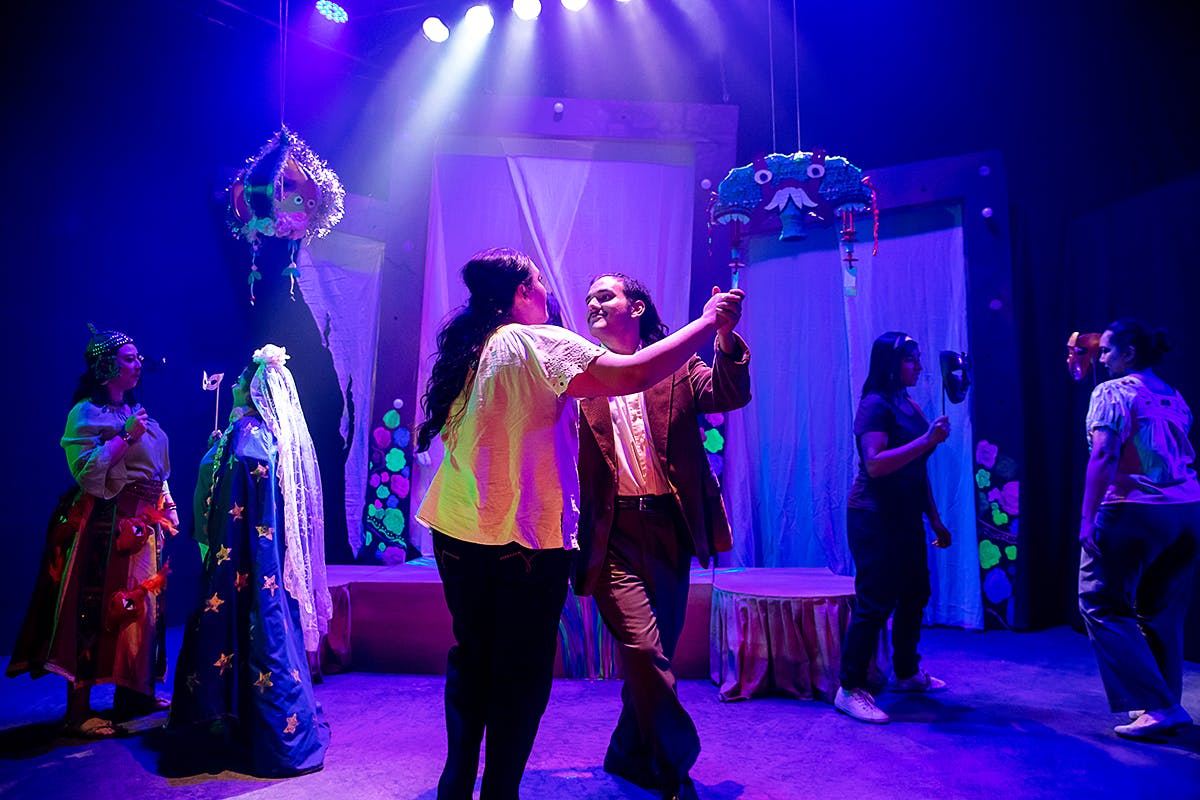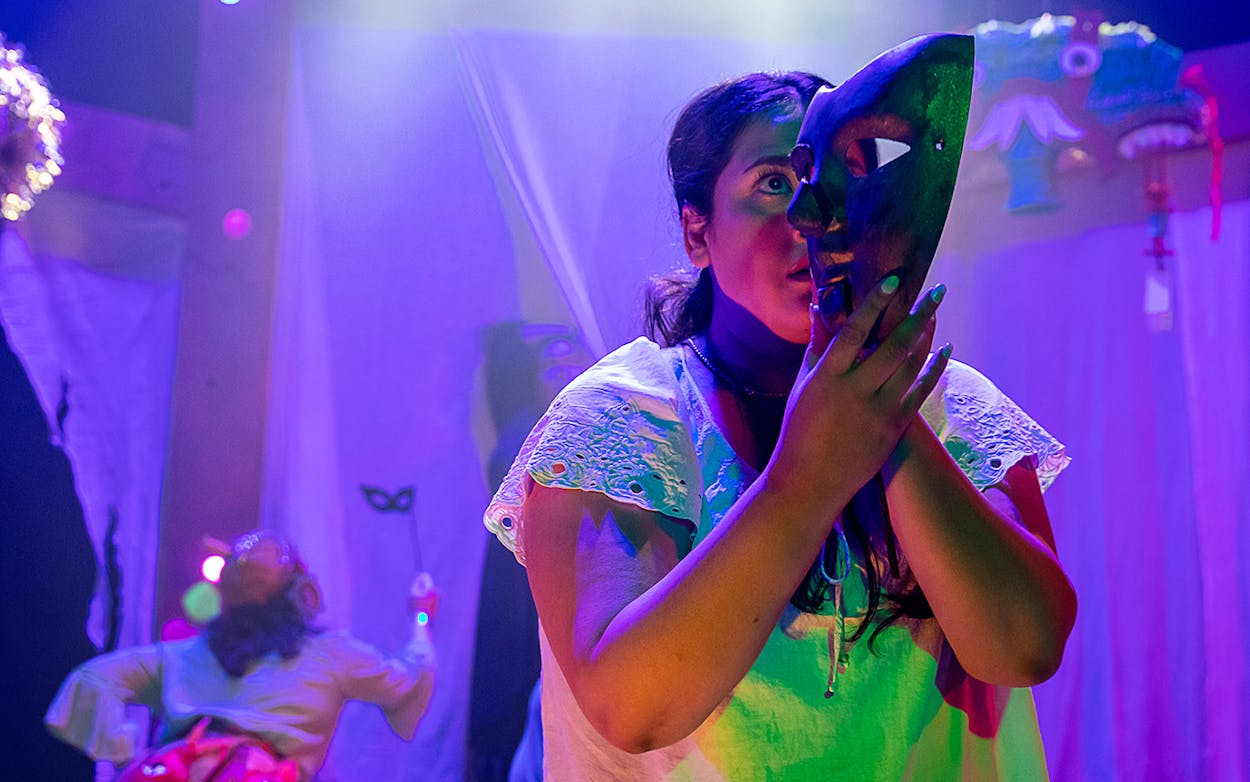Standing on a modestly sized black box stage, the Ciudad Juárez-born poet Jesús Valles muses on lost loves, juvenescence on both sides of the border, and the shooting this year that left 22 El Pasoans dead. The room is silent save for one audience member weeping in the front row. It’s a somber night at East Austin’s The Vortex theater—but Valles isn’t finished. “I also wrote a poem about tías in space!”:
“On a spaceship somewhere, long after the empires collapse—somehow—even in this future, amidst motherboards and cast-aside MRE’s, every Cool Whip and Country Crock tub is still deceitful…housing nothing like its original cargo but instead salsa and this week’s beans…”
Wiping tears from their eyes, audience members cheer and snap as Valles lays out a cathartic vision for the future. At this point, it’s hard to discern sobs from laughs.
During a performance kicking off the city’s second annual FuturX Festival earlier this month—a five-day showcase of provocative Latinx performing arts—Valles felt strongly about portraying the Mexican American experience from several dimensions. “I can’t talk about Latinidad without talking about laughter, fun, sex, wanting, and dancing,” Valles says. “To limit my Latinx experience inside of the present political moment would be to forbid myself from fantasizing about a future where we’re not only alive but laughing, and at the helm of things like space exploration.”
During FuturX, predominantly Austin-based Latinx artists of all backgrounds—their disciplines include theater, dance, standup comedy, improv, and avant-garde performance—took the Vortex stage to deliver musings on the future of Latinidad. While not all feature spaceships, the performances were nonetheless united by a common theme: they were told from perspectives typically ignored by the mainstream.
Not unlike the term “Latinx” itself, the FuturX Festival is a relatively recent phenomenon, and one that aims to be inclusive. “FuturX is a movement of being heard,” says Lilli Lopez, member of the bilingual improv troupe Prima Doñas. “You get Latinx identity intersecting with indigenous, queer, trans, and nonbinary perspectives.” To hear FuturX’s founder and Vortex associate artistic director Rudy Ramirez tell it, the gathering—and its goal to broaden cultural discussion—was a long time coming. “So often when I read Latinx work I get the impression, ‘This play is telling white people what they want to hear—the immigrant who just wants to live the American dream! Look at how we’re just like you,’” Ramirez says.

By contrast, FuturX emerged from a growing dissatisfaction with the narrowness of Latinx stories that were told both in Austin theater and on a national scale. “We can get so insular,” says Paola Ramos, host of Vice Media’s online docuseries LATIN-X. “Especially with the immigration narrative, which is all we hear on mainstream media. In having to continuously reinforce ‘we’re humans,’ we’re actually forgetting that we’re human. We’re forgetting about showing people we’re also artists.” FuturX started with Valles and Ramirez talking about “the idea that the Latinx experience deserves to expand beyond labor or migration in ways that are uncomplicated,” as Valles recounts. As associate artistic director, Ramirez had been exploring ways to bring Latinx voices to the Vortex, a local place that already had made great strides in foregrounding African American work, such as playwright Lisa B. Thompson’s Underground. When directing Valles’s 2018 show, (Un)Documents, a solo performance using both Latinx and queer identity to discuss citizenship, Ramirez saw an opportunity: an entire festival of fresh Latinx work, with Valles as the headliner. Valles immediately agreed. “Here was this beautiful opportunity to showcase the many ways in which we are performers,” they say.
Since it started, FuturX has blossomed from a three-day festival to five; it’s also nearly doubled its lineup of performers. It’s this growth that’s reflected in the event’s annual flagship performance expanding from a one-man piece to a full theatrical production with Mas Cara—a new stage play showcasing Latina womanhood via its protagonist’s journey through a toxic marriage. “As [Latinx women] we’re so often portrayed as either the sexpot, the abuela, or the crazy,” says Mas Cara’s Afro Latinx playwright, Krysta Gonzales, adding: “We can be all of those and more!”
In applying these same archetypes to three goddesses of Mexican folklore, Gonzales’s play examines colonization’s far-reaching effects, as well as the many pressures Mexican women face from within their own cultures. It’s a piece Ramirez was eager to direct because the future they see within FuturX is complex. “Typically, there are two threads you hear when discussing the future of [Latinx] identity,” says Ramirez. “One is traditionalist: saying ‘we have to preserve the status quo of tradition.’ The other is going mainstream: adopting white American values and norms. [FuturX] is for those who don’t want to fit into either.”
While many of FuturX’s performances this year appropriately critiqued problematic elements of Latinx culture that can run deep, such as machismo and homophobia, others scrutinized traditions. This included a dance showcase by UT graduate student Jessica Peña that, by way of its half burlesque, half TED Talk presentation, challenged the likes of Mexican dance ensemble Ballet Folklorico’s appropriation of dance from indigenous cultures. “[Folklorico] sells these dances as ‘authentic’…without acknowledging its colonizer past,” says Peña. “We readily critique white nationalism, but not how it’s embedded in Latin American societies.”
For artists like Siri Gurudev, a Colombian-born, nonbinary PhD candidate at UT, FuturX offers a place to view tradition through this critical lens. “I come from a country violent in terms of gender and homophobia,” Gurudev says. I grew up hurt by my traditions. Although I recognize their value, I didn’t have the privilege to be part of them. Futuristic narratives are the only hope for a queer subject. I want more openness to be who I am. That’s not what I have currently, so what else is there?” At this year’s festival, Gurudev’s performance, titled Cybermestiz@Bar, portrayed a gender-bending cyborg from the future who looks back on problematic lyrics of “ancient” musical genres, such as ranchera and reggaeton, and rewrote them with an antiracist, feminist twist. (That involved changing song titles from, say, “Rebota” to “Se Nota.”) It was a colorful, irreverent, and wholly original performance—exactly the kind of work that FuturX seeks to do more of moving forward.

While Latinx performance scenes exist in Austin, the city lacks a unifying space where ideas and experimentation can flourish. Local university theater programs and more visible companies, such as ZACH Theatre, occasionally stage Latinx-centric shows. But a wealth of performances aren’t readily—or regularly—being showcased in mainstream spaces. “Often, [with Latinx shows on mainstream stages] you’ll see a lot of appropriation, particularly of indigenous aesthetics,” says Emily Aguilar, board chair of the bilingual theater company Teatro Vivo. “I’d love to be a fly on the wall for conversations where established white theater companies decide to do ‘Latinx work.’ Who’s in charge of these stories? Is it seen as just ‘filling a quota?’ I mean, if it wasn’t, you’d see more brown people in leadership positions.”
What’s more, performers say this dearth of resources causes further rifts in the community. “We don’t support each other,” explains Luis Gutierrez, artistic director of the Spanish language performance group ProyectoTeatro. “Brown artists only get about 8 percent of the city’s cultural funding. We’re fighting for that and not coming together.” Ramirez adds: “We need to start thinking about interdependence. Given our ever-shrinking arts budgets—plus gentrification—Latino artists are losing space, both physically and within the community.” Despite these institutional roadblocks, Austin’s comedy scene has made considerable strides in recent years to amplify local voices. The city’s improv, sketch, and standup comedy community has seen a boom of inclusion within the past three years, with the emergence of several all-Latinx improv troupes like Prima Doñas and ¡Escandalo!, as well as such performers as Laura de la Fuente, Linzy Beltran, and Vanessa Gonzalez (whose Comedy Central standup debut premiered in October 2019).
It’s these artists’ ability to not only succeed within their improv/performance circles but also form bonds with like-minded Latinx artists that’s played a major role in this movement. “Group chemistry has so much to do with success in improv,” says Lilli Lopez of forming the Prima Doñas. “We had so many shared cultural experiences—[Prima Doñas] felt like ‘this was where I belong.’” With an ability to cultivate strong Latinx followings, these troupes and performers have earned prime-time runs at Austin’s top comedy theaters and festivals (including Hideout, ColdTowne, and Fallout theaters as well as Out of Bounds Comedy Festival and Austin Sketch Fest), and some of the city’s most coveted arts honors, including the Austin Critics Table and B. Iden Payne awards. “[Latinx comedy] has always been built on ‘if we don’t do this, who else will?’” says Adrian Villegas, founder of the long-running sketch troupe Latino Comedy Project. Villegas believes it’s this DIY mindset that’s finally forced Latinx comedy onto Austin’s mainstream stages.”There’s a sense of ‘I deserve to be onstage’ in this new generation, of ‘I’m gonna find my peers, and we’re gonna do good work,'” says Villegas. “They’re confident in their potential, and they’re not wrong!”
As executive producer of Austin’s ColdTowne improv theater, Dave Buckman believes its audiences’ positive reaction to shows like Prima Doñas’ Latinauts—the first all-Latinx work to grace his stage—that’s currently shifting producers’ perspectives, too. “For the longest time there was one ‘funny.’ That was it. That’s what was taught,“ says Buckman. “But there’s importance in letting other voices in—even if you don’t necessarily understand it or like it as a producer, you can understand they’re speaking to their audience.”
Granted, it doesn’t hurt FuturX’s ticket sales that these Latinx comedy acts are bringing along loyal followings. But the festival’s intended purpose goes beyond getting butts in seats. Each performing arts genre represented at FuturX comes with its own preestablished Latinx congregation, and the aim is to cross-pollinate these fans into a more dedicated, multigenre Latinx audience for the other fifty-one weeks of the year. “Networking ourselves will keep our audiences connected,” says Ramirez. “Producers need to see Latinx audiences want to see themselves on stage.” Krysta Gonzales adds: “There’s great, affirming power in storytelling that says, ‘You’re not alone, I see you.’”
Among the many Latinx audience members laughing at jokes about chanclas and menudo, there was also a sizable contingent of patrons who—despite not necessarily understanding every line or cultural reference—still find value in narratives that aren’t written solely for them. “We’re in the middle of people paying attention for the first time,” says Buckman, who’s noticed a similar phenomenon at ColdTowne’s Latinx-helmed performances. “We’ve yet to see the effects of this fully. But I think the benefits will be more than we can imagine right now. “
At Vortex’s lobby and bar, audiences from all nationalities and genders chatted in English and Spanish, sharing stories and talking about the performances they’d seen at FuturX. When the box-office bell rang to signal the next performance, people let out a cheer. “I think this is when the festival’s bones set in,” says Valles. “This year’s [been] tremendous in establishing what I hope will become a tradition.”
One need only look around the packed house for FuturX’s final Mas Cara performance to see that the poet isn’t alone in that hope. Here, the future of Latinx performance felt especially palpable. FuturX has never been about fantasy or space travel; instead, it’s been a place where Latinx voices come together to finally speak their piece. “There’s hope in FuturX,” says Gonzales. “A hope that one day the mainstream, too, understands there’s something to learn from listening to a story that isn’t 100 percent yours. We all have so much to gain when we can just shut up and listen.”






